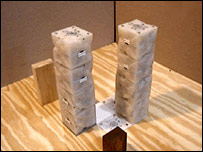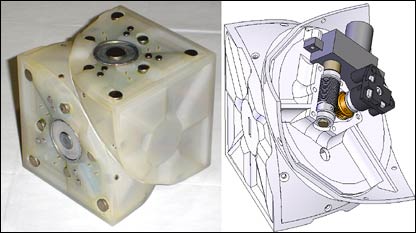Untitled Document
 |
| The experiment shows reproduction is not unique to biology,
the scientists argue |
US researchers have devised a simple robot that can make copies of itself from
spare parts.
Writing in Nature, the robot's creators say their experiment shows the ability
to reproduce is not unique to biology.
Their long-term plan is to design robots made from hundreds or thousands of
identical basic modules.
These could repair themselves if parts fail, reconfigure themselves to better
perform the task they have been set, or even to make extra helpers.
So far, the robots, if they can be called that, consist of just three or four
mobile cubes.
Each unit comes with a small computer code carrying a blueprint for the layout
of the robot, electrical contacts to let it communicate with its neighbours,
and magnets to let them stick together.
By turning and moving, the cubes can pick up new units, decide where they belong,
and stack them alongside each other to make new devices.
In a little more than a minute, a simple three-cube robot can make a copy of
itself.
That offspring version can then make further copies. It is only a toy demonstration
of the idea, but lead researcher Hod Lipson, of Cornell University in Ithaca,
New York, has bold plans for these intelligent modular machines.
"Space applications clearly come to mind. If you're sending a robot to
one of Jupiter's moons, and the robot breaks, then the mission is over,"
Dr Lipson told the BBC.
"So you would like to have a robotic system that can adapt, or to repair
itself, remotely. So that would be one clear application."
Other applications could be down mines or in nuclear facilities. The researchers
have previously used aspects of evolution to help them design robots.
Combining this with the biology of self-repair and of replication would make
huge changes to the field of robotics.
 ;
;

